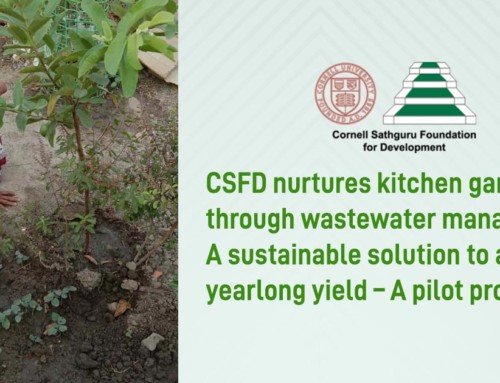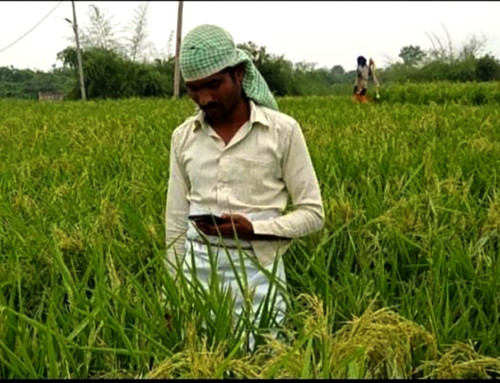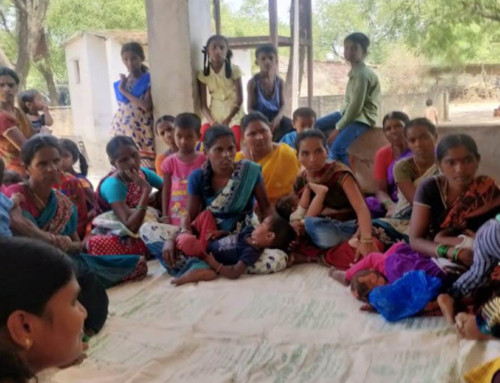CSFD ensures health, nutrition and gender equality among marginalized communities in Telangana, India
Shafiya Begum’s experience in her words
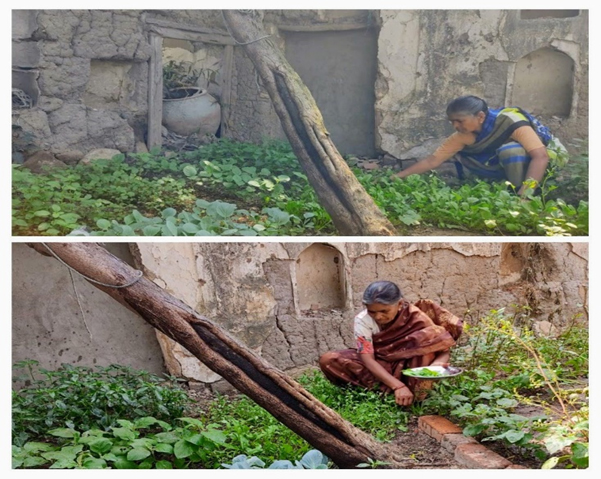
Cornell Sathguru Foundation for Development (CSFD), promotes kitchen gardens for improving food and nutrition security among small farm holders. So far it has promoted two phases of kitchen gardens in two villages with a key objective to improve access to fresh and nutritious food.
Shafiya Begum, a first-time kitchen garden grower from phase II is all excited to share her experience. She says that they are saving around Rs. 1000 per week on vegetables and that savings are very crucial for her family. She has joined the initiative witnessing the benefits of CSFD phase one kitchen gardens in Paniyal and Badampet villages in Sangareddy district. Except for some vegetables that sprouted voluntarily in her backyard, she never grew any vegetables systematically before. This is the first time for her to manage a proper garden and says that nurturing kitchen gardens is a fulfilling experience.
“I am a single mother heading a joint family of 15 members. I have three sons, three daughters-in-law, and 8 grandchildren. I work as a helper in Paniyal Anganwadi . Currently, it is closed due to the COVID crisis, so there is no job for me since April 2020. We are not from farming communities. We normally engage in non-agricultural activities for livelihood. My sons work as auto drivers, and one son helps me on our dairy farm. We have 5 buffalos and sell milk daily worth Rs. 600 to a local vendor. Since I work in Anganwadi, I am aware of the importance of consuming nutritious food.
All my grandchildren are of growing age and they need good food to grow strong.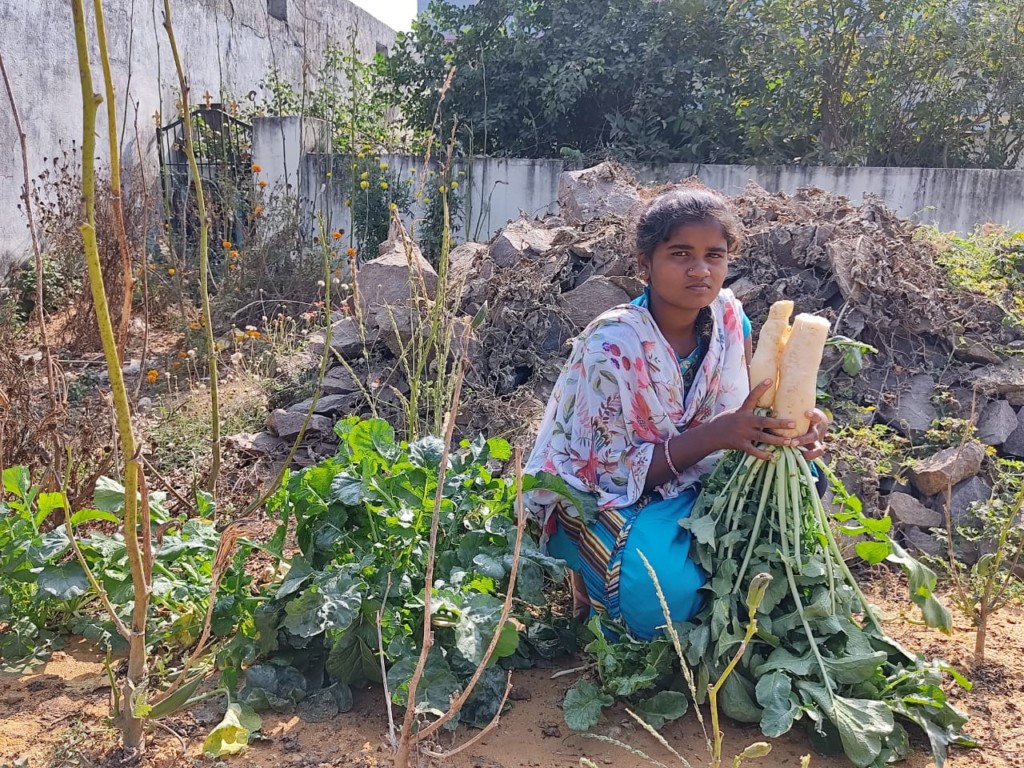 I try my best to give nutritious food to my family, but feeding 15 persons with the right type of food is very expensive. Sometimes we compromise with limited vegetables, pulses and meat. Just for vegetables, we have to spend around Rs. 1000 per week and you can imagine how much it would cost for other food items.
I try my best to give nutritious food to my family, but feeding 15 persons with the right type of food is very expensive. Sometimes we compromise with limited vegetables, pulses and meat. Just for vegetables, we have to spend around Rs. 1000 per week and you can imagine how much it would cost for other food items.
Last year, I saw some households growing kitchen gardens with the support of CSFD. I saw them enjoying nutritious fresh vegetables. I thought I shouldn’t miss if there is an opportunity in the future. To my zeal, the phase II gardens was discussed with us post lockdown in the self-help group meetings. I have registered my name, got trained and received agri-inputs. The seed kit given by CSFD consisted of 11 vegetables and 4 types of greens. They gave us seeds considering our food habits and also the vegetables that would ensure a range of essential micronutrients like proteins, carbohydrates, vitamins, magnesium, iron, folate, manganese, zinc, potassium, sodium, calcium, fibre, phosphorous etc. CSFD has also raised awareness about the importance of having a nutrient-rich diet.
We have sown the seeds immediately after the training, but unfortunately, our State received unprecedented heavy rains in September and October and all our gardens were washed away. CSFD once again motivated and guided us to resow. Our gardens are now thriving with vegetables and greens. I first harvested leafy greens and then vegetables like brinjals, tomatoes, chilies, cabbages, bottle guards etc. I can feed my family with the required quantities of vegetables now. I am completely growing vegetables organically. We don’t have any agricultural land, but after kitchen gardens experience, I feel like leasing out some and experiment with growing vegetables commercially.
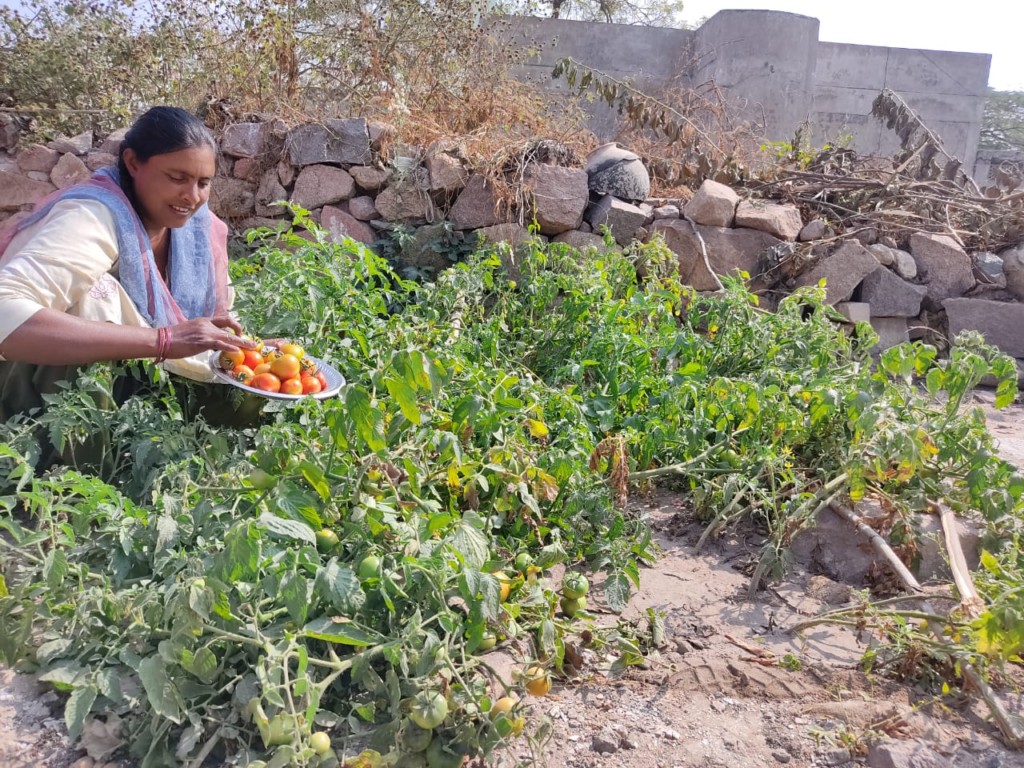 I feel happy that as Anganwadi helper I have learned a few important things about health and nutrition. And this knowledge is helping me feed my family with a balanced diet. I heard Integrated Child Development Services (ICDS) officers talk about the importance of nutrition and issues around malnourishment and undernourishment. I am told that these days children are suffering from undernourishment in villages therefore children growth is stunted. But in villages, people are not aware of eating the right type of food. Before COVID, I heard that to bring down stunting in children of 0-6 years, under POSHAN Abhiyaan program our Anganwadi would be growing a kitchen garden to ensure availability of diversified vegetables for cooking meals and for promoting the habit of healthy eating among the beneficiaries. But it hasn’t started so far, perhaps the program would start once we reopen. With my experience, I strongly feel that kitchen gardens have great scope for ensuring food and nutrition. But people should understand that and take kitchen gardens program more seriously.”
I feel happy that as Anganwadi helper I have learned a few important things about health and nutrition. And this knowledge is helping me feed my family with a balanced diet. I heard Integrated Child Development Services (ICDS) officers talk about the importance of nutrition and issues around malnourishment and undernourishment. I am told that these days children are suffering from undernourishment in villages therefore children growth is stunted. But in villages, people are not aware of eating the right type of food. Before COVID, I heard that to bring down stunting in children of 0-6 years, under POSHAN Abhiyaan program our Anganwadi would be growing a kitchen garden to ensure availability of diversified vegetables for cooking meals and for promoting the habit of healthy eating among the beneficiaries. But it hasn’t started so far, perhaps the program would start once we reopen. With my experience, I strongly feel that kitchen gardens have great scope for ensuring food and nutrition. But people should understand that and take kitchen gardens program more seriously.”
While Shafiya Begum shares her understanding of nutrition and issues around malnutrition and undernourishment, the Global Nutrition Report 2020, stated that India will miss 2025 targets for all four nutritional indicators, i.e. stunting among under-5 children, anemia among women of reproductive age, childhood overweight and exclusive breastfeeding. The report revealed that children are still experiencing dietary shortfall and anthropometric failures. The report also identified India as one with the highest rates of domestic inequalities in malnutrition. The situation has worsened with the spread of the COVID-19 pandemic and the ensuing lockdown. As a way forward, the report recommended that simple and effective initiatives should be designed and delivered to end malnutrition in all its forms.
Findings of the global nutrition report are alarming calling attention to more efforts from government and civil society organizations to improve nutrition indicators. Addressing poor quality diets and malnutrition is critical to achieving many of the Sustainable Development Goals (SDGs), and not just SDG2 “End hunger, achieve food security and improved nutrition, and promote sustainable agriculture”. Ensuring good-quality diets will help unlock the development potential of individuals, boost economic productivity and reduce expenditure in areas such as health and social protection.
CSFD’s phase one kitchen gardens have proved to be a promising approach,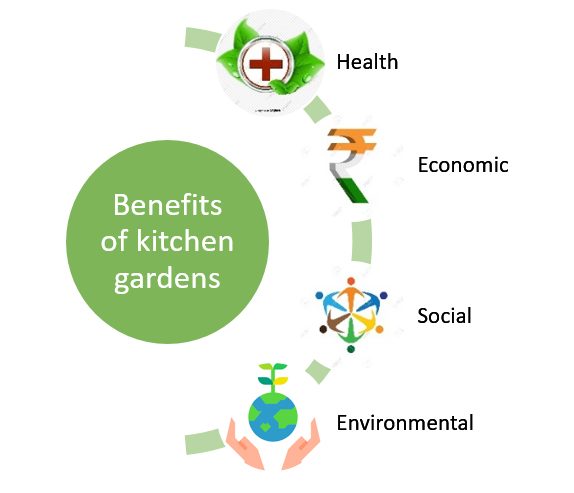 very cost-effective, meet the balanced dietary requirements of families and also add to the family income. An assessment of phase one gardens was conducted to understand the impact of the project. The study revealed that phase one kitchen gardens yielded vegetables sufficient for four families. Both primary stakeholders who managed the gardens and 3 secondary stakeholders’ who received vegetables as sharing have consumed vegetables in sufficient quantities as per the nutritional requirements. The assessment showed, there was a saving of about Rs. 7500 per household for six months and saved around 27.24 KgCo2 emissions for transportation per family leading to the reduction in carbon footprint. This also increased the ability of households to invest their savings in other social and economic needs. During the COVID period, kitchen gardens proved handy enabling them to consume value-added products they have processed such as pickles and dehydrated leafy vegetables and seasonal vegetables that helped in minimizing their market visits thereby maintaining social distancing.
very cost-effective, meet the balanced dietary requirements of families and also add to the family income. An assessment of phase one gardens was conducted to understand the impact of the project. The study revealed that phase one kitchen gardens yielded vegetables sufficient for four families. Both primary stakeholders who managed the gardens and 3 secondary stakeholders’ who received vegetables as sharing have consumed vegetables in sufficient quantities as per the nutritional requirements. The assessment showed, there was a saving of about Rs. 7500 per household for six months and saved around 27.24 KgCo2 emissions for transportation per family leading to the reduction in carbon footprint. This also increased the ability of households to invest their savings in other social and economic needs. During the COVID period, kitchen gardens proved handy enabling them to consume value-added products they have processed such as pickles and dehydrated leafy vegetables and seasonal vegetables that helped in minimizing their market visits thereby maintaining social distancing.
The kitchen garden is a small solution yet has great potential to reap significant impact. But for fostering transformation, it is important to work collectively both as institutions and families to reach our nutritional targets. As a way forward, nurturing more and more gardens in villages with locally preferred vegetables, consistent awareness of the importance of consuming nutritious food, and enabling equal access to food without any gender bias is crucial. Kitchen gardens have great potential for reducing domestic inequalities in malnutrition, because, gardens are by and large managed by women and have control over the produce and income. This will help in minimizing the inequalities in accessing food, achieving gender equality and improving decision making power to invest savings in education and social needs of their families.
Also, it is important to explore ideas such as using kitchen wastewater to nurture sustainable kitchen gardens and achieve yearlong yield for improving nutrition, incomes and the environment.
[i] Anganwadis centres are a government program in India under the flagship of Integrated Child Development Services – ICDS which provides food, preschool education, primary healthcare, immunization, health check-up and referral services to children under 6 years of age and their mothers.
[ii] POSHAN Abhiyaan is a Government of India’s flagship program to improve nutritional outcomes for children, pregnant women and lactating mothers.
Author:

Raja Rajeswari
Associate Vice President – Development

